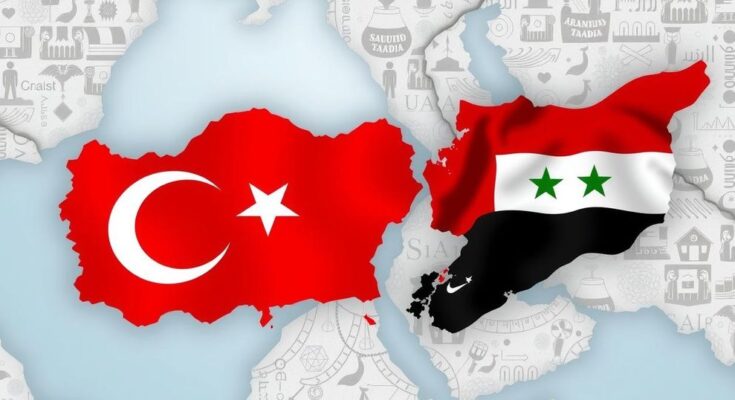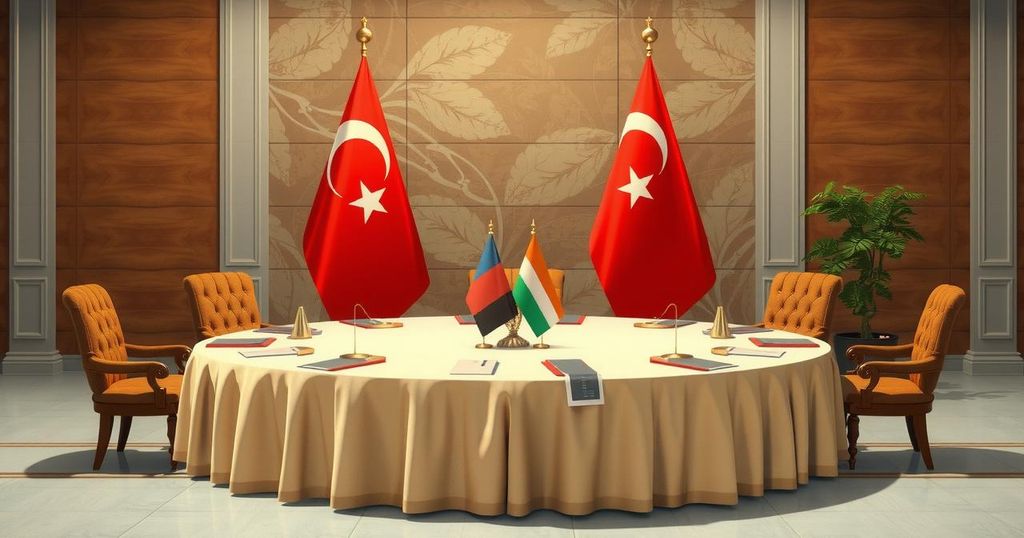In the wake of Bashar al-Assad’s regime collapse, Turkey is pursuing support from Saudi Arabia and the UAE to establish a stable Syrian government. Turkish officials are determined to learn from past mistakes and emphasize regional collaboration while navigating the complexities of HTS and the implications of Russian military presence. Turkey’s goals include fostering a neutral and inclusive Syria that does not threaten neighboring countries, necessitating significant investment for reconstruction from Gulf and Western nations.
Turkey is actively seeking the support of Saudi Arabia and the UAE in shaping a new government in Syria following the rapid collapse of Bashar al-Assad’s regime. Ankara is cautious, aiming to avoid the errors of the Arab Spring while recognizing the necessity of assistance from both regional allies and Western powers. President Recep Tayyip Erdogan intends to align with Gulf nations that have been hesitant regarding Islamist movements like the Muslim Brotherhood to secure a stable future for Syria, which has a population of 20 million.
As part of this effort, Erdogan is scheduled to engage in discussions with Egyptian President Abdel Fattah el-Sisi, who shares concerns about the growing influence of Hay’at Tahrir al-Sham (HTS) in Syria. Although Turkey has historically denied any direct support for HTS, it acknowledges its influence over the group. Turkish Foreign Minister Hakan Fidan emphasized Turkey’s unique understanding of HTS, stating, “No one knows this group better than Turkey,” further indicating military and logistical support for HTS to facilitate stability in the region.
Amidst discussions in Jordan with various international stakeholders, Turkey has advocated for a non-sectarian and inclusive Syrian government, emphasizing the rights of women and minorities. A crucial goal for Ankara is establishing a neutral Syria that does not pose a threat to its neighbors, explicitly including both Israel and Iran. Fidan expressed that Turkey does not seek domination in the region and called for collective cooperation among Gulf nations to prevent external powers from exploiting regional tensions.
Interestingly, Turkey’s engagement has shifted opinions among Gulf leaders, who previously supported Assad’s regime. Abdulkhaleq Abdulla, a notable academic affiliated with the UAE, recently remarked on the UAE’s pivotal role in investing in Syria’s economy following their active engagement with the HTS-led government.
Furthermore, any reconstruction efforts in Syria will depend heavily on financial backing from the Gulf and Western nations, with the EU signaling an increased willingness to participate in Syria’s recovery initiatives. However, Russia’s role remains a significant concern, with its military presence complicating the geopolitical landscape. Turkish officials are hopeful that Russia will recognize the authority of the HTS-led administration, thereby facilitating broader international support for Syria’s stabilization.
The article discusses Turkey’s strategic attempts to solidify its influence in post-Assad Syria by forming alliances with Gulf nations such as Saudi Arabia and the UAE. Following the swift fall of Assad’s regime, Turkey is focused on ensuring that the new Syrian government is stable and non-threatening to its neighbors. The historical context relates to the prior Arab Spring events that led to regional chaos, making Turkey cautious about subsequent interventions in Syria. Turkey is also navigating the complicated dynamics associated with the presence of Russian military forces in Syria and the need for financial support from Western entities for reconstruction efforts.
In conclusion, Turkey is seeking collaboration with Saudi Arabia and the UAE to establish a stable government framework in Syria following the fall of Assad’s regime. This entails avoiding past mistakes, supporting HTS for stabilization, and emphasizing regional cooperation. While Turkish officials aim for a non-threatening and inclusive Syrian state, their approach must contend with the overarching influence of Russia and the need for substantial financial support for reconstruction. Ultimately, Turkey’s engagement may reshape the geopolitical landscape of the Middle East as it seeks to foster cooperative regional frameworks.
Original Source: www.middleeasteye.net




